Research theme

Disaster and the power to live
We are conducting various studies on human mind and behavior in disasters.
In particular, we clarified 8 factors (leadership, problem solving, altruism, stubbornness, etiquette, emotion regulation, self-transcendence, and active well-being) of the “power to live with disasters” in a survey of survivors of the Great East Japan Earthquake (2011), and using this questionnaire we are conducting various surveys, behavioral experiments, and clarification of their psychological and brain bases. We aim to apply the results of our research to disaster management and general education.
Eight Personal Characteristics Associated with the Power to Live with Disasters as Indicated by Survivors of the 2011 Great East Japan Earthquake Disaster (Sugiura et al., PLoS ONE, 2015)
A Concise Psychometric Tool to Measure Personal Characteristics for Surviving Natural Disasters: Development of a 16-Item Power to Live Questionnaire (Ishibashi et al., Geosciences, 2019)
Surveys and behavioral experiments
Psychological Processes and Personality Factors for an Appropriate Tsunami Evacuation (Sugiura et al., Geosciences, 2019)
Survival-oriented personality factors are associated with various types of social support in an emergency disaster situation (Sugiura et al., PLoS ONE, 2020)
Two Major Elements of Life Recovery After a Disaster: Their Impacts Dependent on Housing Damage and the Contributions of Psycho-Behavioral Factors (Sato et al., J Disaster Res, 2021)
Self-help and mutual assistance in the aftermath of a tsunami: How individual factors contribute to resolving difficulties (Sugiura et al., PLoS ONE, 2021)
Intentional binding and self-transcendence: Searching for pro-survival behavior in sense-of-agency (Niikuni et al., Conscious Cogn, 2022)
Adaptability, supernaturalness, and the neurocognitive basis of the self-transcendence trait: Toward an integrated framework through disaster psychology and a self-agency model (Sugiura, Front Behav Neurosci, 2022)
Does the eight-factor “power to live” in disaster exist since childhood? (Matsuzaki et al., Front Public Health, 2022)
Personality Traits and Types of Housing Recovery after the 2011 Great East Japan Earthquake and Tsunami (Honda et al., Sustainability, 2023)
Motivational decline and proactive response under thermal environmental stress are related to emotion- and problem-focused coping, respectively: Questionnaire construction and fMRI study (Kawata et al., Front Behav Neurosci, 2023)
Coping behavior under COVID-19 pandemic (Ding et al., Front Psychiatry, 2023)
Adoptation to digitization society (Hamamoto et al., Front Psychol, 2023)
Tsunami evacuation online experiment (Takubo et al., J Disaster Res, 2024)
Better-Than-Average effect (Ding et al., Fron Psychol, 2024)
Brain studies
Taking another’s perspective promotes right parieto-frontal activity that reflects open-minded thought (Miura et al., Social Neuroscience, 2020)
Automatic adaptive emotion regulation is associated with lower emotion-related activation in the frontoparietal cortex and other cortical regions with multi-componential organization (Sugiura et al., Front Behav Neurosci, 2023)
Why people hesitate to help: Neural correlates of the counter-dynamics of altruistic helping and individual differences in daily helping tendencies (Wijaya et al., Front Psychol, 2023)
Social-coalitional trait is related to coping capacity with mortality threat: association with leadership and a reduced parietal response to mortality salience (Hirano et al., Front Psychol, 2023)
- The Self in the Brain
- Where value comes from?
- Language and communication
- Disaster and the power to live
- Human brain science for the future
Related News
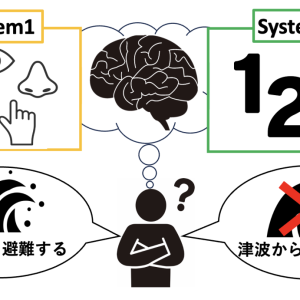
202308.19
Differences in Tsunami Evacuation Decision-Making Process by Information Type(Grand Poster Prize)
It has been hypothesized that human decision making is based on dual process theory, i.e., logical/a

202308.18
How can we adapt to and benefit from the gdigitalized societyh? (Paper publication)
Digitalization has been rapidly facilitated due to the COVID-19 pandemic all over the world. Some ca

202308.10
A Multifactorial Framework of Psychobehavioral Determinants of Coping Behaviors (Paper publication)
COVID-19 has greatly changed people’s lifestyles due to taking precautions and dealing with ge

202307.13
Social-coalitional trait mitigate the death threat in the brain (Paper publication)
"One day you will surely die, too." There are various hypotheses about the relationship be

202306.07
Personality traits related to psychological resilience (symposium presentation)
Among the eight factors of “power to live with disasters,” leadership, emotional regulat

202305.27
Does self-transcendence trait suppress brain response to environmental thermal stress? (Conference presentation)
The self-transcendent trait, which is closely related to religiosity, prosociality, and wellbeing, a
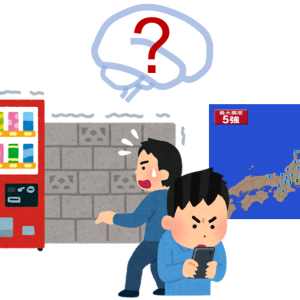
202305.22
Differences in neural processes of tsunami evacuation decision-making by information type (conference poster presentation)
Information processed during tsunami evacuation after an earthquake can be divided into two major ty
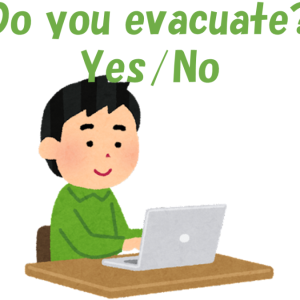
202305.22
Investigation of the validity of evacuation attitude assessment using fictitious scenarios (conference presentation)
Do the same psychological processes operate in tsunami evacuation decision-making under fictitious e
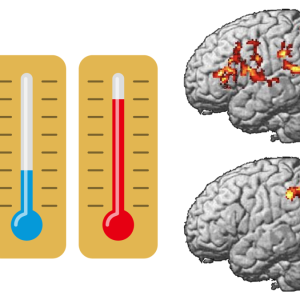
202304.12
Individual differences in response to heat and cold ( Paper publication)
Some people are unable to move when it's hot, others happily venture out into the snowy mountain
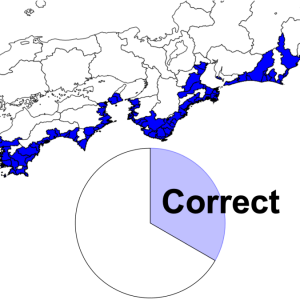
202304.01
Issues in responding to the Nankai Trough Extra Information (Paper publication )
A survey of coastal residents, including those living in areas subject to evacuation, revealed that

